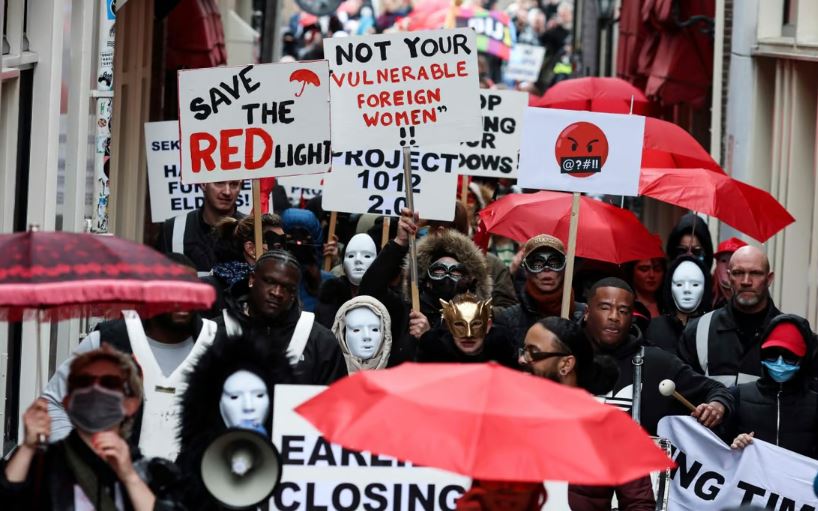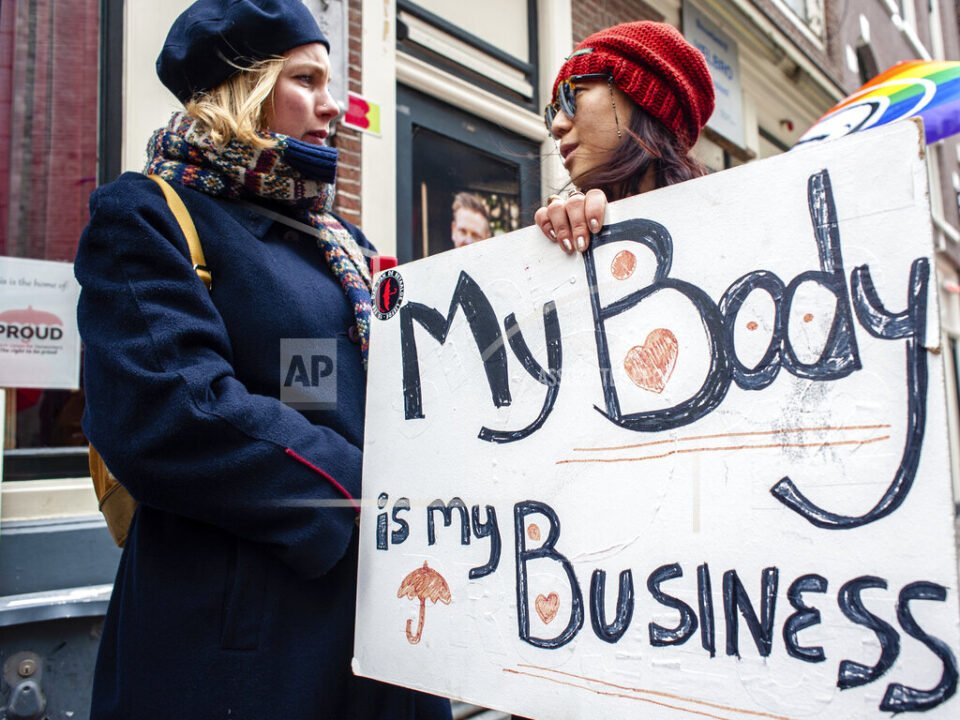Amsterdam is intensifying its efforts to rebrand its “go wild” and “no rules” image because of its overwhelming popularity. The red lights may soon be turned off for its city center brothels, and drunken Britons are being advised to stay at home. There are also efforts to restrict cannabis use.
According to officials, new laws governing sex workers go into effect on April 1 and will require Amsterdam’s sex work establishments to close their doors at three in the morning. instead of 6 a.m. to stop visitors to the red-light district from engaging in disruptive conduct, according to the local authorities.

The shorter hours coincide with the municipal council’s continuing attempt to relocate sex workers to a “erotic center” outside of the city. Additionally, Amsterdam is pushing for an aviation levy to address low-cost flights and is imposing regulations on holiday rentals and waterway cruises.
A number of sex workers told CNN that the reforms targeted at them are raising stigma and that they feel unfair discrimination and scapegoating for the city’s issues with mass tourism.
According to a representative for the deputy mayor of Amsterdam, Sofyan Mbarki, the restrictions are intended to make the city livable and argue that “we now have to chose restriction instead of irresponsible growth.”
lost earnings and safety worries

Former sex worker Felicia Anna, who has resided in Amsterdam for 13 years and goes by Felicia Anna (not her true name due to privacy concerns), is the head of Red Light United, a union for window workers in the city’s red-light district.
According to Anna, the shortened hours will significantly lower window workers’ earnings, leaving many of them barely able to meet costs like window room rent and taxis to go home safely.
According to Anna, “the majority of the laborers start to work after 12 or 1 in the morning, when the bars start to close down.” You may only have two hours left to make any money, which is insufficient.
Due to privacy concerns, Violet, a sex worker and coordinator for the Prostitution Information Centre (PIC), an Amsterdam-based organization that disseminates knowledge about sex work, uses an alias name.
Violet claims that the transgender community will be severely impacted by the shortened hours because many customers arrive between three and one in the morning. to 6 a.m. Employers of transgender sex are desired.
She discussed welfare issues for all sex workers and how these can affect their capacity to return home securely.
When Violet compared traveling home at three in the morning to six in the morning, which they claimed has more social activity and transportation options, she said: “If you’re traveling home at three in the morning, especially if everything is closed, then that leaves you, as a sex worker, in greater vulnerability.”
“Most of the time, we make money in cash. We might therefore be moving around with a lot of cash at that time in the morning. This allows people who want to hurt us a chance to do so if there aren’t many people in the streets, Violet added.
The red-light district’s bureaucracy
A second effort by the city council to close window establishments and relocate sex workers to an erotic center outside of the city center is taking place in the background of the new restricted hours restriction.
On Thursday, a city council meeting that was debating potential locations for the proposed erotic center was disrupted by a protest organized by sex workers.

According to Red Light United, protesters gave Amsterdam Mayor Femke Halsema a petition with 266 sex workers’ signatures calling for additional police in the red-light district rather than early closure dates and a shift to an erotic center.
Halsema has argued that an erotic center will relieve strain on the red-light area and establish a space where sex workers can work safely and undisturbed, claiming that some visitors view window workers as nothing more than a tourist attraction. Red Light United, a group of sex workers, disagrees, claiming that the erotic center would foster a climate that encourages greater crime and “shady” activity.
Working behind a window is advantageous because it is visible and makes you feel safer. You don’t get the same sense in an erotic center since you’re enclosed in a structure, Anna explained.
Safety worries were echoed by Violet, who argued that some social protections would also be lost if sex workers were relocated.
As Violet explained, “If you shift the red-light district out, you are going to get more concentrated behaviors in a place that can’t be regulated as well, and isn’t under public attention.
One of the best things about being a sex worker in Amsterdam, according to Violet, is that when people try to take pictures with their cameras, not only the sex workers but even the locals lend a hand. Violet also noted that “the Dutch aren’t scared to tell people off.”
Limitations for sex workers are simply one element on Amsterdam’s rebranding strategy that says, “People are not going to stay away.” As previously mentioned, further regulations, including as lockout policies, limitations on the sale of alcohol, and a prohibition on smoking in public places, are also planned to be implemented in the red-light district.
The city council has also launched a number of efforts, such as the “Keep Away” initiative, which was first directed at young British men by triggering a video warning them against antisocial conduct if they search for terms like “stag party,” “cheap hotel,” or “bar crawl” in Amsterdam.

The campaign, according to a representative for Amsterdam’s deputy mayor Sofyan Mbarki, began in the UK because “part of this group is strongly represented in the nightlife in the city center, along with more than average nuisance behavior.” However, the spokesperson stressed that this is just the first stage of the campaign and that “within the next months this campaign will also start in other EU countries and in the Netherlands itself.”
British males are no worse behaved than other tourists, according to Felicia Anna and Violet’s personal observations. Both of them further stated that locals as well as visitors were engaging in bothersome behavior.
The Amsterdam mentality of no regulations, which Anna agrees needs to alter, is where she sees the bigger issue.
Anna stated that despite all the advertisements urging people to stay away, they wouldn’t listen. “You must instruct individuals on proper behavior. It must be done; otherwise, nothing will ever change.
This isn’t a zoo, Anna said. Visit the red-light area, but act properly.
Violet argued that the effort would backfire and urged for increased education, noting that “this targeting advertising makes it sound more like a vice city.”
Violet encouraged, “Respect this place like you would treat your own hometown or community.”




